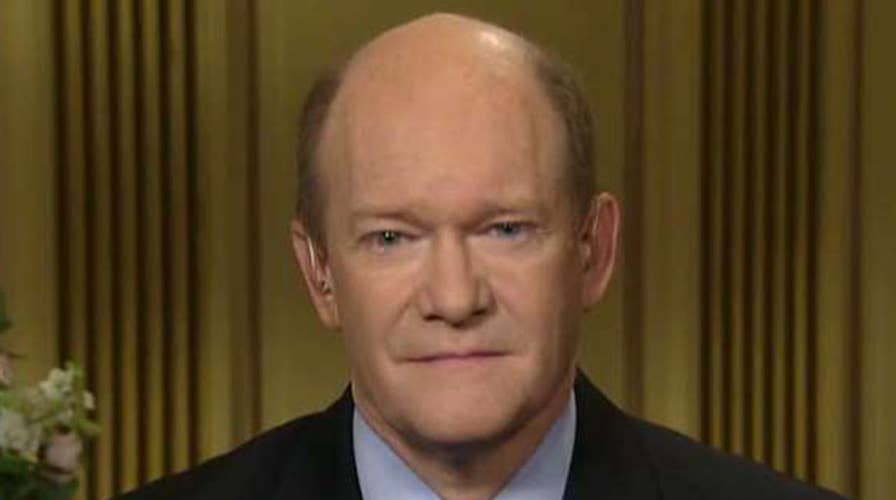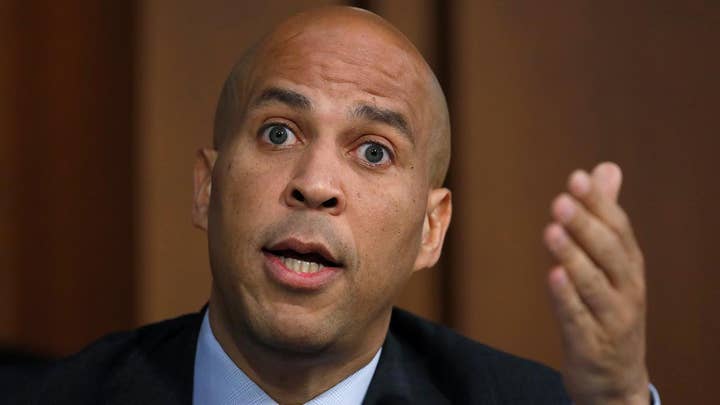Chris Coons on whether Democrats can block Kavanaugh
Democratic member of the Senate Judiciary Committee Chris Coons recaps Brett Kavanaugh's Supreme Court confirmation hearings and looks ahead to the Senate vote on President Trump's pick to replace Justice Kennedy.
A top Democrat on the Senate Judiciary Committee on Sunday refused to rule out the possibility that Sen. Cory Booker, D-N.J., is facing an ethics committee investigation for releasing confidential documents during the confirmation hearings for Supreme Court nominee Brett Kavanaugh last week.
Speaking exclusively to "Fox News Sunday," Sen. Chris Coons, D-Del., who also serves on the Senate Ethics Committee, repeatedly refused to confirm or deny the existence of a formal probe into Booker's actions.
"I have to be careful what I say here, because I'm the vice chairman of the Ethics Committee, and in that role I can't comment on anything that may or may not come before the committee," Coons said. He added: "I really can't comment on whether or not this is breaking the rules of the committee."
When pressed by Wallace on whether Booker was facing an ethics probe, Coons stayed mum.
"I can't comment on that," the Delaware senator said. "The rules of the ethics committee prohibit any member of the committee from commenting on whether a matter is before the committee or not." Coons then confirmed that meant he could not deny the existence of a probe.
In a dramatic moment on Thursday morning, Booker announced that he would release a series of Bush-era documents, which included Kavanaugh's thoughts on racial profiling in the wake of the September 11 terror attacks and his assessment of the Supreme Court's views on Roe v. Wade.
ANALYSIS: CORY BOOKER TRIES BUT FAILS TO VIOLATE SENATE RULES IN COMEDY OF ERRORS
The documents appeared to be labeled "committee confidential," meaning they were cleared to be viewed only by the Senate Judiciary Committee, not the public.
“This is about the closest I'll probably ever have in my life to an ‘I am Spartacus’ moment,” Booker said, making sure to emphasize that he felt he was risking expulsion from the Senate for what he claimed were serious rules violations. Senators can only be expelled by a highly extraordinary two-thirds vote of their colleagues, which has not occured since the Civil War.
GRASSLEY UNLOADS ON BOOKER: 'CAN I ASK HOW LONG YOU'RE GOING TO SAY THE SAME THING?'
A Judiciary Committee spokesperson told Fox News late Thursday that at least some of the emails Booker had released were still "committee confidential" when he published them hours earlier, suggesting Booker had, in fact, violated Senate rules, although Republicans confirmed earlier in the day that they had cleared many of the documents for public release the night before Booker posted them on Twitter.
One of the documents was a 2003 email that had been marked "committee confidential" in which Kavanaugh wrote: "I am not sure that all legal scholars refer to Roe as the settled law of the land at the Supreme Court level since Court can always overrule its precedent, and three current Justices on the Court would do so."
Kavanaugh, then a lawyer in the George W. Bush administration, was being asked for his opinion on a draft Op-Ed to be bylined by pro-life women. He repeatedly told Democrats that the email reflected only his opinion on the views of "legal scholars," and were not necessarily a fair reflection of his own opinions.
Democrats also highlighted a 2001 email referenced on Wednesday in which Kavanaugh seemed dismissive of Department of Transportation regulations that gave preference to minority-owned companies, even where they did not offer the most competitive bid on a particular contract.
"The fundamental problem in this case is that these DOT regulations use a lot of legalisms and disguises to mask what in reality is a naked racial set-aside," Kavanaugh wrote, as part of his analysis that conservative members of the Supreme Court would “realize as much in short order and rule accordingly.” Kavanaugh on Thursday defended the email as an assessment of his views on the Supreme Court's probable take on the matter.
And in 2002, Kavanaugh wrote that he "generally" favored racially neutral security measures in the long term. But he acknowledged that administration officials would need to "grapple" with the viability of a potential interim solution that included race as a consideration, suggesting that until race-neutral policies could be effectively implemented, national security concerns in the aftermath of the September 11 attacks could demand another approach.
Coons told Wallace that he remained "gravely concerned that [Kavanaugh] is not inside the judicial mainstream on several really important precedents that would have a real impact on individual rights and liberties of Americans and on presidential power."
But the top Democrat agreed with the Trump administration on one thing: that the anonymous author of a New York Times Op-Ed describing efforts to undermine his presidency from within should leave the White House.
"I agree with that position; I think the honorable thing to do is to resign and to go public with the author's concerns about the president’s fitness to serve," Coons said.























